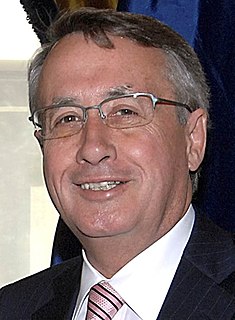A Quote by Bruce Pittman
Elon just presented a plan for settling the solar system in this century that is realistic and affordable. In my paper, 'A Pathway to a Thriving Commercial Space Economy' at IAC, I also laid out a path forward to a growing economy in space that produces new opportunities for all.
Related Quotes
The chief moral obligation of the 21st Century is to build a green economy that is strong enough to lift people out of poverty. Those communities that were locked out of the last century's pollution-based economy must be locked into the new, clean and renewable economy. Our youth need green-collar jobs, not jails.
The future is about wings and wheels and new forms of space transportation, along with our deep-space ambition to set foot on another world in our solar system: Mars. I firmly believe we will establish permanence on that planet. And in reaching for that goal, we can cultivate commercial development of the moon, the asteroid belt, the Red Planet itself and beyond.
This new economy that's just emerged has a new central economic actor. It's not the worker, the person who produces, nor the person who consumes, the purchaser. It's a new actor that does both things at the same time, call them a creator. They both create and consume in the same single act, and we're just beginning to see the shape of this new economy and it changes not just the economy itself, it's going to change the whole nature of the work relationship.
I really love sharing with young Canadians the changes we're seeing in the space program right now with what we call "commercial space." We have commercial cargo delivery to the space station, and now we have what we call "commercial crew," where we're going to be delivering people to low orbit on new vehicles that are being designed by Boeing and SpaceX.
Most people think of the economy as producing goods and services and paying labor to buy what it produces. But a growing part of the economy in every country has been the Finance, Insurance and Real Estate (FIRE) sector, which comprises the rent and interest paid to the economy's balance sheet of assets by debtors and rent payers.
In fact, Clinton-era publications of the US Space Command describe control over space as a parallel to control over the oceans a century ago. Then, countries built navies to protect and enhance their power in commercial and strategic interests. Today, the militarization of space is intended to protect US investments and commercial interest and US hegemony around the world.
I'd like to reiterate that the opportunities in space are going to be vastly different than they've been before, so, for young Canadians preparing for their futures, it's important to understand that there are going to be many opportunities to work in either new space industries that are being developed or to actually go to space, to be one of the people to join our team of explorers who are going to leave lower-Earth orbit. That, ultimately, is amazing, the opportunities we'll have.
As you begin to create more destinations, that will naturally create a stronger economic pipeline for space. And just as we have been the leader of commercial air travel for the first century, as we look to the second century of aviation, I would expect Boeing to be the leader in both air and space travel.



































